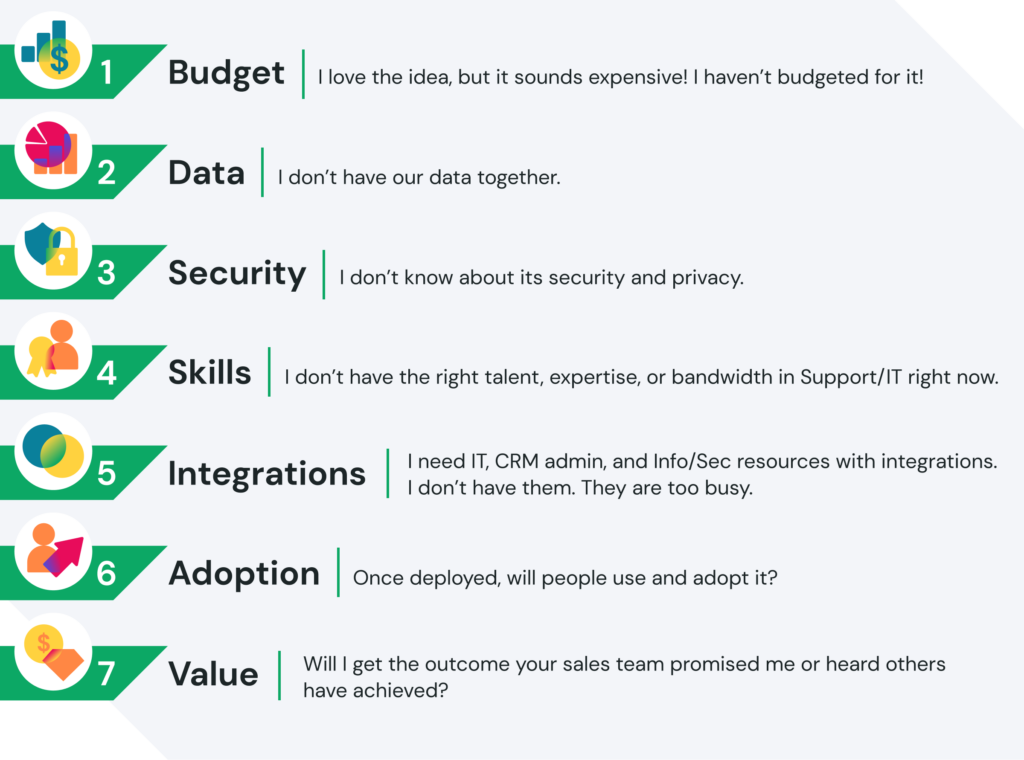
Jul 15, 2022
AI in Customer Support: The Mindset Shift You Need for Success
customer supportService ExperienceSupport Experience
In today’s business world, the pressure is on Customer Support leaders to do more with less. They are expected to manage risks and create growth opportunities for their enterprises – all while providing excellent customer service. It’s a tall order that is only getting taller as artificial intelligence (AI) becomes more prevalent in the customer support landscape.
In my conversations with Support leaders in 1:1 and group settings, I’ve found that mindset causes the highest uncertainty around using AI in Customer Support.
When speaking with Support leaders about the future of Support, excitement is the first reaction – with expectations of substantial business benefits because they know that AI is not just an efficiency play. But as we start to explore what AI can do for Customer Support, it quickly becomes apparent that there is a need for a mindset shift. We must move from thinking about customer support as a cost center to recognizing it as a key driver of customer value. AI can help us make this shift by providing the ability to identify and resolve customer issues before they become problems proactively. By analyzing customer data, AI can help support teams identify patterns and trends, provide intelligent recommendations and automate specific tasks, AI can free up support staff to focus on more value-creation activities and deliver personalized experiences.
Today’s customer support leaders are under pressure to do more than just extract incremental efficiencies. They’re being called upon to manage risks and create growth opportunities – all the pressures their enterprises face now. There is recognition that they will need technology with AI/ML/NLP and novel workflows to help them get where they need to go. The technology must not only execute the rules they set out but also work alongside people to add judgment and learning. What does this shift mean for those of us in customer support? First, we must embrace a new mindset.
Support may no longer think of itself as merely order-takers or problem-solvers. We must see ourselves as value-creators – partners in our customers’ success. We must think of ourselves as stewards of the customer relationships, responsible for their growth and health. This means taking a proactive approach to problem-solving and identifying opportunities to build customer loyalty and advocacy. It also means being comfortable with change, since the customer support landscape is constantly evolving. Second, we must invest in the right technology. AI/ML/NLP will play a critical role in helping us scale our operations and deliver proactive support and personalized experiences at scale. But we must also remember that technology is only part of the equation – it’s people who ultimately create value for our customers. The best customer support teams will be those that combine the power of technology with creativity, empathy, and collaboration.
Let’s first look at some of the common objections we hear about deploying AI in Customer Support. Some of the objections are reminiscent of the early days of SaaS/cloud technology adoption. Do these sound familiar?

These are significant hurdles and obstacles. To overcome them, there has to be a mindset shift. Mindset, by definition, is the set of implicit beliefs everyone is driven by and uses to make decisions.
Here are five of those mindset shifts that the most competitive Support Leaders will have to make:
1.) Intelligent Support is Different from Automated Support
For all the progress we’ve made in the last 20+ years in automating processes, the mission of adding intelligent capabilities to a function (like intelligent case assignment) is fundamentally different. When you automate a process, you must tell the solution precisely what you want it to do and how you want it to. All too often, automation is limited in terms of freeing us up. We never get the time back we hoped when we automated, and we end up tethered to the process.
By contrast, an Intelligent process means giving more independence to people and technology in their realms to increase total productivity. So in Support, it means using AI/ML/NLP that transcend automation, using combinations that enable us to be freed up for activities where our creativity, situational flexibility, and emotional intelligence are more critical.
This difference between Automated Support and Intelligent Support is not just a matter of degree; this is a difference in kind. We will not get to an Intelligent future simply by automating more. There is a quantum leap change with the applications for predicting and preventing escalations, intelligent case assignment, and case evaluations and coaching for our customers.
In summary
- Automated Support simplifies and speeds up processes based on predefined rules. The same results from the same input, unless you change the rules. No learning is involved.
- Intelligent Support enables systems and processes to learn from data, identify patterns, and recommend decisions without human involvement. Intelligent Support improves by learning and enables dynamic workflows.
2.) Accept that Intelligent Support is Harder to Understand
Automating a process is hard, although it is not conceptually hard. When you automate a process, you understand what the technology has to do to get from point A to point B. AI is challenging us differently. It is hard to understand how Machine Learning works and how the ensemble of ML models interacts for the right decisions. The difficulty in understanding AI is not because it is new.
3.) Start with Use Cases but Don’t Go Small
With automation, buyers are hard-wired to start small to avoid costly failures with technology. But investing in AI and making headway needs more than just starting small. AI is data-hungry. The more information you feed it, the more valuable the solutions will be. So if you really desire success using AI, there is no way around implementing end-to-end use cases.
4.) Get Used to Decisions Made by AI
The way a mindset shift helps us unlock the possibilities of intelligent support is to think about how our brains have been trained to interact with technology. We tended to think of technology as a supporting tool, with human judgment necessary to make big decisions. This was a world of automation. Technology did the grunt work. We told it what to do and how to do it, but we reserved humans for things that require judgment, decision-making acumen, and flexibility. We need to become comfortable delegating the decision-making to technology.
5.) AI Frees You from Biases
When it comes to decisions free from racial, gender, or social biases, AI does much better than humans. It is not enough for AI to make correct and accurate decisions. It needs to be fair, safe, and secure. Support leaders need to learn what it means to build trust in technology and to let technology learn as they learn.
What do you think?
To conclude, getting into the right AI mindset is not a trivial task but something we need to get our teeth into as leaders. These five concepts will help. Below are additional resources on the evolving Support landscape.
Are you using AI in your customer support organization? If not, what’s holding you back? Share your thoughts in the comments below.
Don’t miss out
Want the latest B2B Support, AI and ML blogs delivered straight to your inbox?






